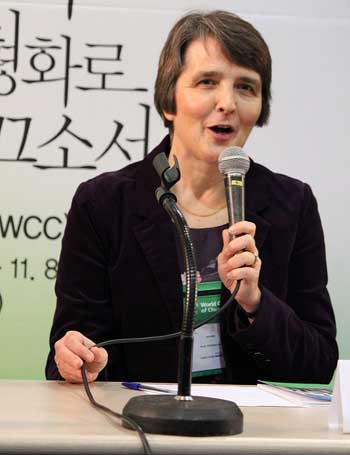
The seemingly unambiguous statement of Jesus of Nazareth found in John 14:6 — “I am the Way, the Truth and the Life; no man cometh unto the Father but by me” (KJV) — collided with the open-minded evangelism espoused by both the World Council of Churches and the World Evangelical Alliance in Busan, South Korea on Nov. 4.
The WCC unveiled its first statement on evangelism in over 30 years, “Together towards Life: Mission and Evangelism in Changing Landscapes,” at a plenary session. The document, composed of four sections, emphasized what speakers called “holistic” evangelism: “Mission of the Spirit”; “Mission of the Spirit toward fullness of life”; “New ways of doing evangelism”; and “Mission towards fullness of life: new affirmations and concepts of mission.”
Presentations at the plenary session caused concern for traditionalists. A handout for the event summarized the problem areas: “The three reflections will address: first, the pneumatological aspect of mission in the presence of the life-giving Spirit; a theological approach will emphasize the dynamic, transformative aspect of mission in the Spirit. Second, the new ways of witnessing together to the Gospel of life; responding to the needs of our time it is essential to explore and point to concrete action points. Third, the holistic view of mission towards fullness of life in justice and peace; concrete life-affirming changes that mission has contributed will be illustrated. Acknowledging the importance of including Inter-religious dialogue in the mission plenary, the intention is to make reference of this aspect through each of the above three reflections.”
Seemingly absent was any direct reference to the “Great Commission” of Matthew 28, to “go and make disciples” of all nations.
One focus of concern for some attending the WCC Assembly was this statement from the “Together towards Life” document: “God’s Spirit, therefore, can be found in all cultures that affirm life. The Holy Spirit works in mysterious ways, and we do not fully understand the workings of the Spirit in other faith traditions. We acknowledge that there is inherent value and wisdom in diverse life-giving spiritualities.”
For some evangelicals, this statement implies universalism, the belief that God will ultimately save all human beings who practice some kind of “life-giving” spirituality. They point to the teaching of Jesus in John 14, and several European journalists asked WCC and WEA representatives about this at two subsequent news conferences.
Kirsteen Kim, professor of Theology and World Christianity at Leeds Trinity University in Britain, responded by saying the “[Holy] Spirit moves much wider than the Christian community.” Jooseop Keum, secretary for the WCC Commission on World Mission and Evangelism asserted that he read Matthew 28 “from a contextual context” of what was prevalent in the Roman Empire, and not as an “imperial” command to go forth and disciple others.
Keum added, “Can we really possess divine wisdom as created beings? I don’t think so. There are many wisdoms in the world that inform life.”
The WCC’s “Together towards Life” statement granting “value and wisdom” to non-Christian faiths was fine with Thomas Schirrmacher, chair of the Theological Commission of the World Evangelical Alliance. He said the document “does not contain any statement we could not sign,” noting the only discussion between the two groups would be “when it comes to emphasis” of certain aspects.
One hopeful note was sounded during the morning: Rabbi David Fox Sandmel of the International Jewish Committee on Interreligious Consultations offered greetings to the assembly, and said, “Today, in many parts of the worlds, Jews and Christians now live in harmony. While we disagree about whether the Messiah is to come or come again, we are, in the felicitous phrase of the Christian theologian Clark Williamson, ‘partners in waiting.’ Until that day, we can and must work together to alleviate suffering, promote justice and repair our world for the reign of God.”
The Seventh-day Adventist Church is active in mission in more than 200 nations of the globe, and has historically opposed efforts to restrict evangelistic outreach in the name of ecumenism. Observers and journalists from the Church attend WCC assemblies to monitor the ecumenical movement, about which Adventists have long had concerns related to their understanding of Bible prophecy.